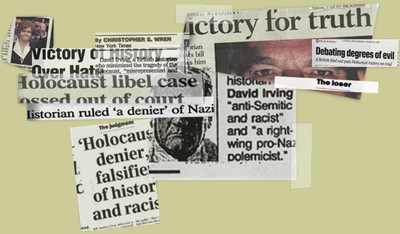Brief Background: Mr. Irving and the Case Itself
 |
Introductory Collage on the Holocaust Denial on
Trial website (link)9
|
Between January and April, 2000 a legal dispute would rock the British courts, and for that matter history itself, when David Irving, author of numerous books on the Nai era filed a lawsuit against Deborah Libstadt, a distinguished professor, over her book, Denying the Holocaust: Growing Assault on the Truth and Memory, and her publishing company, Penguin Books Ltd. The lawsuit was based on Mr. Irving's claim that his reputation as a historian has been defamed. [1]
David Irving began his life in Essex, England. He would later go on to spend a year at Imperial College but left after failing a math exam. He moved to Ruhr, Germany and worked as a steelworker (all the time perfecting his German) but his real aspirations lied in becoming a freelance historian. After extensive research on the WWII he began to publish several books on the subject (though never actually obtaining a degree), including: The Destruction of Dresden (1963), The Destruction of ConvoyPQ17 (1967), but perhaps his most known piece of literature was his 1977 publication of Hitler's War (perhaps also his most controversial). [2]
As a historian how is it possible to deny such a documented period in history? This is the root of the case itself. Libstadt, in the book in question, says that Irving, although familiar with the material, bends the information until it reflects his own views and ideas. Although Irving claims that, he does not deny that "the holocaust happened but, based on his extensive knowledge of the archives, he challenged three vital aspects of the history of Hitler's extermination of European Jews:
1) That Jews were killed in gas chambers at Auschwitz concentration camp in Poland;
2) That Hitler directly ordered the mass murder of the Jewish population of Europe;
3) That there was any systematic plan by the Nazis to destroy European Jewry." [3]
Many people find it hard to believe Irving's statements about not denying the holocaust when he has been known to speak at neo-Nazi gatherings making statements like "more women died on the back seat of Edward Kennedy's car at Chappaquiddick than ever died in a gas chamber at Auschwitz."
Through the four months of deliberation Irving, choosing to represent himself, attempted to sway the judge's view toward his own and convince him that his character and his reputation as a historian were damaged by, what he claimed to be false allegations on the part of the defendants. His argument for questioning the holocaust was that though there were gas chambers at Auschwitz, they were simply for the delousing of dead inmates who had contracted typhus, and that there was no documentation of Hitler ever giving the order (or even being cognizant of the fact) of the "final solution". While, on the other hand, the defendants were trying to prove that their references to Mr. Irving's work were justified. They presented the court with many examples of instances where Mr. Irving misrepresenting or omitting of facts, such as his editing out any mention of the holocaust in his older books after they were reissued.
In the end the defense was able to make its case and gain the legal victory and proved to the judge as to why Irving lied about the holocaust, to which the judge writes, "that Irving qualifies as a holocaust denier. Irving is anti-semitic. Irving is a racist. Irving [is] a right-wing pro-Nazi polemicist." [4]